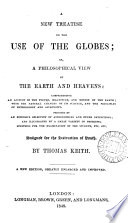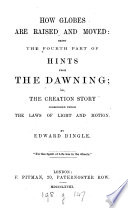 Every body continues in its state of rest or uniform motion in a straight line, except in so far as it is compelled to change that state by a force impressed upon it. Every body continues in its state of rest or uniform motion in a straight line, except in so far as it is compelled to change that state by a force impressed upon it.  The Cornhill Magazine - Page 213edited by - 1907Full view The Cornhill Magazine - Page 213edited by - 1907Full view - About this book
 | Thomas Keith - 1821 - 408 pages
...it is called an uniform accelerative force. GENERAL LAWS OF MOTION. LAW I. " Every body perseveres in its state of rest, or uni"form motion in a straight line, unless it is compelled to " change that state by forces impressed thereon.' — Newton's Princip. Book... | |
 | Thomas Keith - 1848 - 486 pages
...motion of bodies have been deduced : — GENERAL LAWS OP MOTION. LAW I. — " Every body perseveres in its state of rest, or uniform motion in a straight line, unless it is compelled to change that state by forces impressed thereon." — Newton's Princip. Book... | |
 | Aubrey William O. Saunders - 1861 - 162 pages
...exhausted, in the line of fire, agreeably to the first law of motion, by which every tody must persevere in its state of rest or uniform motion in a straight line, unless it be compelled to change that state by forces impressed upon it. Why cannot the bullet do this... | |
 | Edward Dingle - Creation - 1868 - 350 pages
...space, or non-corpuscular atoms of ether, by centrifugal force. He says, — " Every body perseveres in its state of rest, or uniform motion in a straight line, unless it is compelled to change that state by forces impressed thereon."* Now what force is to impress... | |
 | Education - 1902 - 730 pages
...and explain a storage battery. Answers in Physics. 1. (a) Newton's "first law": Every body continues in its state of rest or uniform motion in a straight line except so far as it may be compelled by force to change that state.This "law of inertia" explains the constant resistance... | |
 | Physics - 1903 - 422 pages
...following statement of Newton's First Law (p. 36) harmonizes with the facts : " Every body perseveres in its state of rest or uniform motion in a straight line unless it receives energy from or gives off energy to some other body." Such a statement assumes that... | |
 | Chemical engineering - 1913 - 110 pages
...energy of the moving body. This may be expressed by Hewton»e law of motion that «A body will continue in its state of rest or uniform motion in a straight line, unless acted upon by some applied force*, and in that case "the change from rest or uniform motion... | |
 | Literature - 1908 - 860 pages
...its own flow when it is growing and retard its own decay when it is diminishing; in short, that it exhibits a quality akin to the "inertia" of matter, which tends to retain every material body in its stale of rest or uniform motion in a straight line, except so far as it is compelled by forces to change... | |
 | James Tribe - Steam-engines, Compound - 1899 - 148 pages
...HorsePower MECHANICAL FORCE AND RESISTANCE. Newton's first law of motion reads: "Every body continues in its state of rest or uniform motion in a straight line, except in so far as it may be compelled by impressed forces to change that state." Force an4,resistance, when... | |
| |